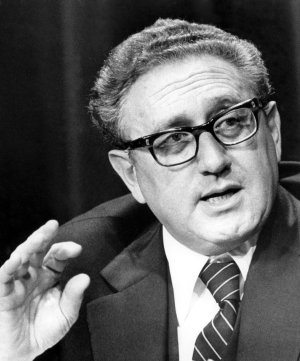The U.S. and Soviet Union continued the policy of detente during 1975. But some resistance came from the AFL-CIO. In August AFL President George Meany announced a boycott of U.S. grain shipments to the Soviet Union ...
President George Meany: "We had our experience in 1972 where the price of wheat was, I think, $1.65 a bushel when the Russians bought it and it went up as high as $6 or $6.50 a bushel within a short time, and the American housewife is still paying for that, and the maritime trades, and with the backing of the AFL-CIO, have made up their mind that that is not gonna happen again."
Ed Karrens: President Ford promised to arrange new long-term agreements with the Russians, agreements he assured would reduce the instability of domestic food prices, which are affected by the wheat and feed-grain sales to the Soviet Union.
Then in October, a five-year agreement was reached in which the USSR would purchase 6 to 8 million tons of U.S. grain each year, and the plan had the protections that Ford promised.
Of all the attempts to improve U.S.-Soviet relations in 1975, none had more of a global impact than a meeting which was held in July by five men, three Americans and two Russians. And while the get-together occurred 100 miles away from any other human, millions around the world saw the handshake in space that was a symbolic gesture of a new try at peaceful coexistence called detente by the two major powers of the world.
First, the two spaceships were launched in their respective countries. Two days later in the blackness of space, they inched closer and closer to each other.
Unknown Speaker: "Okay."
Unknown Speaker: "(Foreign language.)"
Unknown Speaker: "Docking completed."
Unknown Speaker: "(Inaudible), it is completed, Houston."
Unknown Speaker: "Roger."
Unknown Speaker: "(Foreign language.)"
Unknown Speaker: "Well done, Tom; it was a good show! They are looking forward now to shaking hands with you and both of you."
Unknown Speaker: "I wish we had"
Unknown Speaker: "(Inaudible.)"
Unknown Speaker: "Thank you, Alexey."
Unknown Speaker: "(Inaudible) D, E,"
Unknown Speaker: "Thank you very much to you and Valery."
Ed Karrens: Three hours later, Astronaut Tom Stafford and Cosmonaut Alexey Leonov were face-to-face ...
Unknown Speaker: "All right. Hold the show. I am by your (inaudible)."
Unknown Speaker: "Okay, I am opening Hatch 3."
Unknown Speaker: "Ah! Sir!"
Unknown Speaker: "Hello!"
Unknown Speaker: "It'll stay open."
Unknown Speaker: "Okay, play it; play it, Tom."
Unknown Speaker: "Uh, yeah, you need to know this."
Unknown Speaker: "Yes. Come here."
Unknown Speaker: "Okay, turn on the camera. Hit the remote; okay, here."
Unknown Speaker: "Glad to see you."
Unknown Speaker: "Here."
Unknown Speaker: "Did Alexey, aren't you proud?"
Unknown Speaker: "Very, very happy to see you."
Unknown Speaker: "(Inaudible.)"
Unknown Speaker: "This is the Soviets and United States."
Ed Karrens: For two days, the Apollo and Soyuz spacecrafts orbited the Earth linked together while inside the men visited each other's spacecraft, exchanged gifts and food and spoke the other's language.
The success of the flight gave promise to the idea that rescues in space could be achieved if nations cooperated with each other in space exploration.
(00:10:00)
(Music.)











